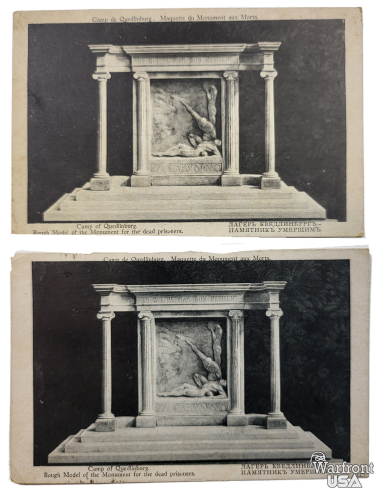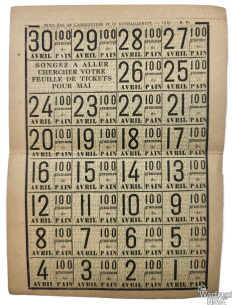Depicts the "Camp of Quedlinburg" with a rough model of the monument dedicated to the deceased prisoners, offering a poignant reminder of the war's human cost.
Includes the imprint "Phot Verglag Otto Wendt Quedlinburg," indicating it was published by Otto Wendt, a common practice for POW camp postcards.
Postcard 1
Postmark : Marked with "Quedlinburg 12.2.18" (February 12, 1918), and additional postal code "10-11V," which might indicate specific routing or censorship details.
A heartfelt message from father to son:
"Mon Camille, J'ai bien reçu ta bonne lettre du 24 Janvier, je suis bien content de savoir que le beau temps te permettait de faire de bonnes sorties au grand air. Que ne donnerais-je pas pour passer de beaux dimanches avec toi. Bons baisers de ton papa."
Translation: "My Camille, I have received your nice letter from January 24th, I am very happy to know that the good weather allowed you to take some nice outings in the fresh air. What wouldn't I give to spend beautiful Sundays with you. Kisses from your father."
Sender Details:
Expediteur: Sergent Marcoux, Georges Emiliez
Prisoner Number: No 1589
Company: 2ème (2nd Company)
Recipient Details:
Name: Monsieur Camille Marcoux
Address: École des Garçons à Latillé (Frankreich), Vienne in France
Postcard 2 sent 3 months after
Stamp: Marked with "Quedlinburg 25.5.18" (May 25, 1918)
A second loving message from a father to his family:
"Mes grands chéris, Je viens de recevoir vos lettres du 21 Avril. Heureux de savoir que vous avez des nouvelles de Jean et de mes frères. J'espère que la grippe d'Amelia a été vite guérie. Bonne santé à tous!. Affectueux baisers."
Translation: "My dear ones, I have just received your letters from April 21st. Happy to know you have news from Jean and my brothers. I hope Amelia's flu was quickly cured. Good health to all! Affectionate kisses."
Same Sender:
Expediteur: Sergent Marcoux, Georges Emiliez
Prisoner Number: No 1589
Company: 2ème (2nd Company)
Recipient Details:
Madame A. Marcoux et Monsieur Camille Marcoux
Address: École des Garçons à Latillé (Frankreich), Vienne in France
Historical Context:
This card is a direct link to the experience of French POWs in German camps, showcasing not just the communication between prisoners and their loved ones but also the efforts to commemorate those who did not return. The model of the monument for the dead prisoners reflects the grim reality of war and the human cost behind the statistics.
Given its age, the card shows signs of wear, including fading of the image or text, postal marks, or slight damage from handling.
Dimensions: The standard postcard size of the era, roughly 14 cm x 9 cm.
Historical Significance: Ideal for collectors of WWI memorabilia, especially those interested in POW experiences, French-German interactions, or postal history.
Provides insight into the personal lives of soldiers, the conditions in POW camps, and the emotional connections maintained through letters during the war.
Note: This postal card is more than a piece of history; it's a testament to the resilience of the human spirit and the enduring bonds of family, even in the darkest times of war.





































